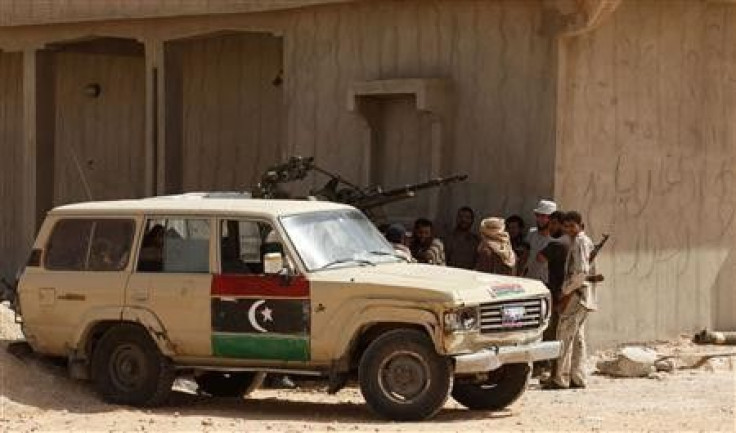U.N. envoy heads to Tripoli as Western line softens

Efforts to find a deal to end the civil war in Libya intensified on Tuesday, with a U.N. special envoy heading for Tripoli and Western powers signalling that Muammar Gaddafi could stay in the country if he gives up power.
U.N. envoy Abdul Elah al-Khatib, who visited the rebels in Benghazi on Monday, is looking for a "political process" that will end a war that has failed to dislodge Gaddafi despite months of rebel attacks backed by NATO bombing raids.
France and other Western members of the anti-Gaddafi coalition have signalled that the Libyan leader could stay in the country provided he and his circle agree to step down.
A rebel leader this week appeared to endorse this view, which would mark a major shift in policy as previous demands have insisted that Gaddafi must leave the country.
Deadlines are approaching for the NATO-led alliance, whose mandate for military action expires on September 27. Hopes have also been expressed that some agreement could be reached before the holy month of Ramadan begins at the start of August.
Britain and France, two of the main backers of the campaign to end Gaddafi's four decades in charge of the North African oil-producing nation, held talks in London at which they called once more for Gaddafi to leave power.
British Foreign Secretary William Hague and his French counterpart Alain Juppe also said that it was up to the Libyan people to decide their own future.
British officials said there had been no change of policy direction, but the comments were interpreted as tacit backing for the proposal that Gaddafi can remain in Libya after quitting. "Gaddafi must leave power," Hague told reporters on Monday evening. "The best way of showing the Libyan people they need no longer be in fear of Gaddafi would be for him to leave Libya. "So that very much remains our position, but it's also very clear that whatever is settled is a settlement which the Libyan people are happy with. It's for them to determine their future, not for those outside to try to lay down that future."
LIBYAN PEOPLE TO DECIDE
Juppe, who has already endorsed the idea of Gaddafi remaining in Libya after leaving power, added: "As far as we are concerned, Gaddafi should renounce any kind of power in Libya and he must commit himself to not play any kind of role."
"Gaddafi is going to have to abandon power and then it will be for the Libyan people to decide what their future will be," Juppe said.
Gaddafi has supported talks with the rebels and with the West. But while he has made clear he backs the idea of his remaining in Libya, he has shown no sign in public of agreeing to the other part of the deal -- stepping down from power.
While rebel forces have been unable to move decisively against Gaddafi, they have accused neighbouring Algeria of bolstering his troops by turning a blind eye to an arms shipment. Algeria denied it had allowed the weapons to be offloaded at an Algerian port.
In his talks with the Benghazi-based rebel leadership council, Khatib, the U.N. envoy, discussed ideas for ending the war but said a firm initiative had yet to take shape.
With a diplomatic push to end the conflict gathering steam, Khatib told Reuters he would canvass government views in Tripoli on Tuesday.
"We did not put a plan in front of them. We discussed the views and ideas on how we can trigger a political process ... to achieve a political solution," he said.
Libyan officials said they expected the Tripoli talks, with senior Gaddafi aides, would cover peace negotiations. But they also wanted to focus on civilian casualties and a desire to urge NATO to stop its air strikes.
NATO has continued to hammer Gaddafi forces around Libya, striking twice in central Tripoli on Monday, and Britain has said there would be no let-up during Ramadan.
But hopes have grown for a negotiated end to a war that has dragged on longer than many initially expected.
Speaking to Reuters after meeting Khatib, senior rebel official Mahmoud Jibril said he had underlined that the rebels would not accept any initiative that did not involve the removal of Gaddafi from power as a first step to peace.
TRANSITIONAL PERIOD
Khatib, a senior Jordanian politician, has said his ideas involve an agreement on a cease-fire and, simultaneously, on setting up a mechanism to manage the transitional period. He has not given details.
"So far, there is no initiative. He is trying to propose some general ideas, see what is acceptable and what is not acceptable, and on the basis of that he can propose an initiative," Jibreel said.
The rebel leaders have given conflicting signals in recent weeks over whether they would allow Gaddafi and his family to stay in Libya as part of a deal, providing he gave up power.
In the latest comment on the issue, opposition leader Mustafa Abdel Jalil told the Wall Street Journal that it would be acceptable.
"Gaddafi can stay in Libya but it will have conditions," he said. "We will decide where he stays and who watches him. The same conditions will apply to his family."
The poorly armed rebels seem unlikely to quickly unseat Gaddafi. Rebels announced they had almost taken the oil town of Brega, but later said that minefields had slowed their advance.
While rebels in the east received a boost this week when Turkey delivered its first cargo of fuel under a multi-million dollar supply deal, a government rocket attack has cut fuel supplies in the frontline western town of Misrata.
© Copyright Thomson Reuters 2024. All rights reserved.











